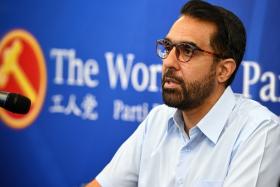Ultimate aim of creating jobs for foreigners is to benefit locals: PM
The ultimate aim of attracting companies into Singapore and allowing them to hire foreigners is to create jobs and improve the lives of citizens, said Prime Minister Lee Hsien Loong yesterday, as he told Singaporeans that the Government is always on their side.
This openness has helped create more opportunities for Singaporeans, and even as Singapore adjusts its policies on work passes, it must be careful not to send the wrong signal that it is no longer welcoming to others, he added.
Reiterating the promise made by several ministers who had spoken before him in the debate on the President's Address, PM Lee said: "The Government will always be on the side of Singaporeans."
"What is the point of creating jobs for foreigners, if it does not benefit Singaporeans? Why would we want to do that?
"Ultimately, our aim is to grow our economy, create good jobs for Singaporeans and raise our standards of living."
His remarks followed two days of debate during which the House discussed, among other matters, the issue of the foreign workforce in Singapore, with many MPs calling for more protection for the Singaporean core in the workforce.
PM Lee, speaking on the third day of the debate, acknowledged that Singaporeans are concerned about fairness and said the Government takes it seriously.
He noted that the numbers of Employment Pass and S Pass holders have come down since Covid-19, and work pass schemes continue to be adjusted.
But he added: "There is no comfort in knowing that the total numbers are not too many, if personally we feel that we have been discriminated against at the workplace, or that the Employment Pass holder working beside us somehow has an inside track."
He said that in considering whether or not to issue Employment and S Passes, the Government looks at whether an employer has kept up its support of local professionals, managers, engineers and technicians (PMETs).
For instance, when a company has an over concentration of a single foreign nationality in its ranks, especially compared with other companies in the same sector, it suggests that the company has not really taken root in Singapore, he added.
"This concentration, if it is unchecked, can cause social resentment and workplace problems. It makes it harder for the company to blend into and be accepted by our multiracial society," he said.
While the economic benefits of Singapore's foreign worker policies were clear, there was a more fundamental question at the centre of the debate on foreign professionals and the Singaporean core, he said.
"What sort of society, what sort of people do we want to be?"
Historically, Singapore as an open port and immigrant nation has always been open to the world and welcoming to others who can add value to society, he added.
"We may be under stress now, but we cannot afford to turn inwards.
"We will adjust our policies to safeguard Singaporean jobs, but let us show confidence that Singaporeans can hold our own in the world."
Get The New Paper on your phone with the free TNP app. Download from the Apple App Store or Google Play Store now


